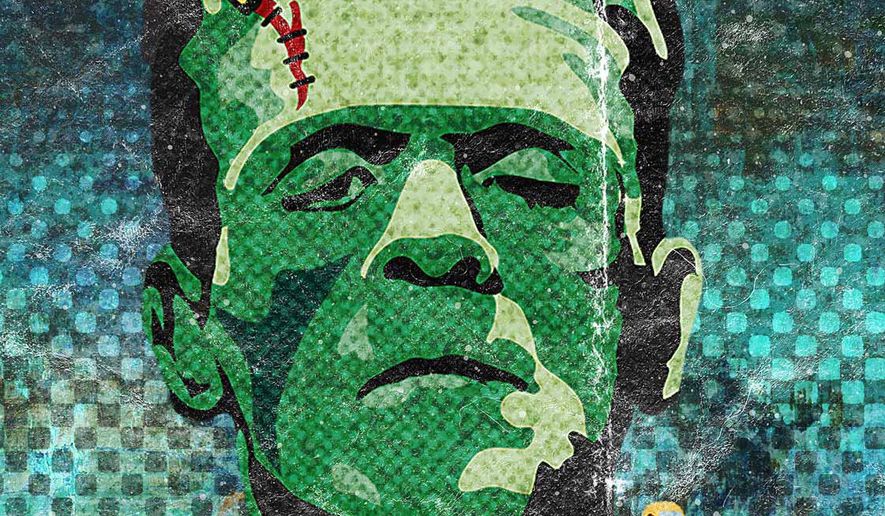OPINION:
In 2017, when I published my book, “Not A Day Care,” I warned that the snowflake rebellion wouldn’t stay on our nation’s campuses. I said that our precious little darlings who were being coddled at Berkeley and Brown would soon graduate and take their immaturity and childish demands for “safe spaces” with them.
I told anyone who would listen that ideas always have consequences and that what is taught today in the classroom will always be practiced tomorrow in our culture. I said that an education grounded in self-absorption would inevitably yield to a nation full of self-absorbed people.
Well, it’s 2021, and the Mary Shelley-like monsters that we have stitched together in our post-modern laboratories, otherwise known as our public schools, are alive and well and demanding we make them feel good about themselves.
Consider this month’s blue-ribbon winner in our nation’s non-stop race to the mythical land of tolerance, affirmation and “self-worth” — Naomi Osaka.
On May 31, Ms. Osaka, the second-ranked women’s tennis player in the world, quit the French Open. Her reason? She needed to retreat to her safe space. She didn’t want to subject herself to any of those nasty journalists asking any difficult questions that would cause her to “doubt herself.” It seems this fragile professional athlete, who is so cursed by intersectionality that she has already earned $55.2 million in 2021, felt triggered by any inquiry that might imply she was less than perfect. Her response to such micro-aggressions was simply to pick up her ball and go home — Literally.
In his recent article, “Confusing Cure and Disease” (Quillette, June 7, 2021), Steve Salerno contends that Ms. Osaka’s abrupt withdrawal from the French Open is symptomatic of a disease sweeping across the Western world. That illness, according to Mr. Salerno, is narcissism, and it has a clear cause: Our terrible schools and their terrible teaching.
“Rhapsodizing over a non-toxic social environment harkens back to what helped get us into this mess in the first place,” says Mr. Salerno. “The [self-esteem] movement took root in American schools premised on the notion that students who struggled in school did so because they felt bad about themselves.” But “re-imagining every aspect of the classroom experience around the imperative of building self-esteem” did not end well, he argues.
“Filling kids with boatloads of self-love” did, however, accomplish something. Terrible teaching and terrible schools have “produced hordes of young adults whose frustrated sense of entitlement [has] left them feeling miserable and anxious.” Their fixation on self-actualization rather than personal responsibility has left them with a sense of “disillusion.”
“Put simply,” says Mr. Salerno, our society’s, “children who have been insulated from consequences expect to continue to be isolated from consequences as they grow up. Having been brought up to believe that [their feelings about themselves] alone rule the day, they may shut down or strike out when they discover that they do not.”
Mr. Salerno’s point is clear. Because America (and frankly, the entire Western world) has bought the lie of self-esteem, we have produced a culture of perpetual adolescents who have “never quite reached adulthood” and we now suffer a pandemic of “forever-children” ill-equipped to deal with the real world.”
In my book, “Grow Up! Life Isn’t Safe, but It’s Good,” I offer this: “Bad teaching tends to create a distorted understanding of how the world works and one’s role within it. Today, bad teaching has led large swathes of society to throw collective temper tantrums. What we teach in our schools is now bearing itself out in the behavior we see in our streets. As Abraham Lincoln is reported to have said, ‘The philosophy of the schoolroom in one generation will become the philosophy of the [culture] in the next.’ Even Hitler understood this simple truth when he said, ‘Let me control the schools, and I will control the state.’ What is taught in a nation’s classrooms will be practiced in that nation’s board rooms, courtrooms, and living rooms.”
The moral to the story is obvious — Selfishness has a cause, and that cause, in great measure, can almost always be traced back to what we teach our progeny. Solomon said it well: “Train up a child in the way he should go, and when he is old, he will not depart.” There is great power in ideas, and what we teach our children will result in either noble or narcissistic ends. Unfortunately, the news of Naomi Osaka’s retreat to her “safe space” is the posterchild of the second and not the first.
Ideas matter. When you teach self-indulgence and narcissism, you are going to get a bunch of self-indulgent narcissists, not just in your colleges but even on your tennis courts.
“Who was I? What was I? Whence did I come? What was my destination…? Accursed creator! Why did you form a monster so hideous that even you turned from me in disgust?” — Mary Shelley, “Frankenstein; or The Modern Prometheus.”
• Everett Piper (dreverettpiper.com, @dreverettpiper), a columnist for The Washington Times, is a former university president and radio host. He is the author of “Not a Daycare: The Devastating Consequences of Abandoning Truth” (Regnery) and, most recently, “Grow Up: Life Isn’t Safe, But It’s Good” (Regnery, 2021).




Please read our comment policy before commenting.